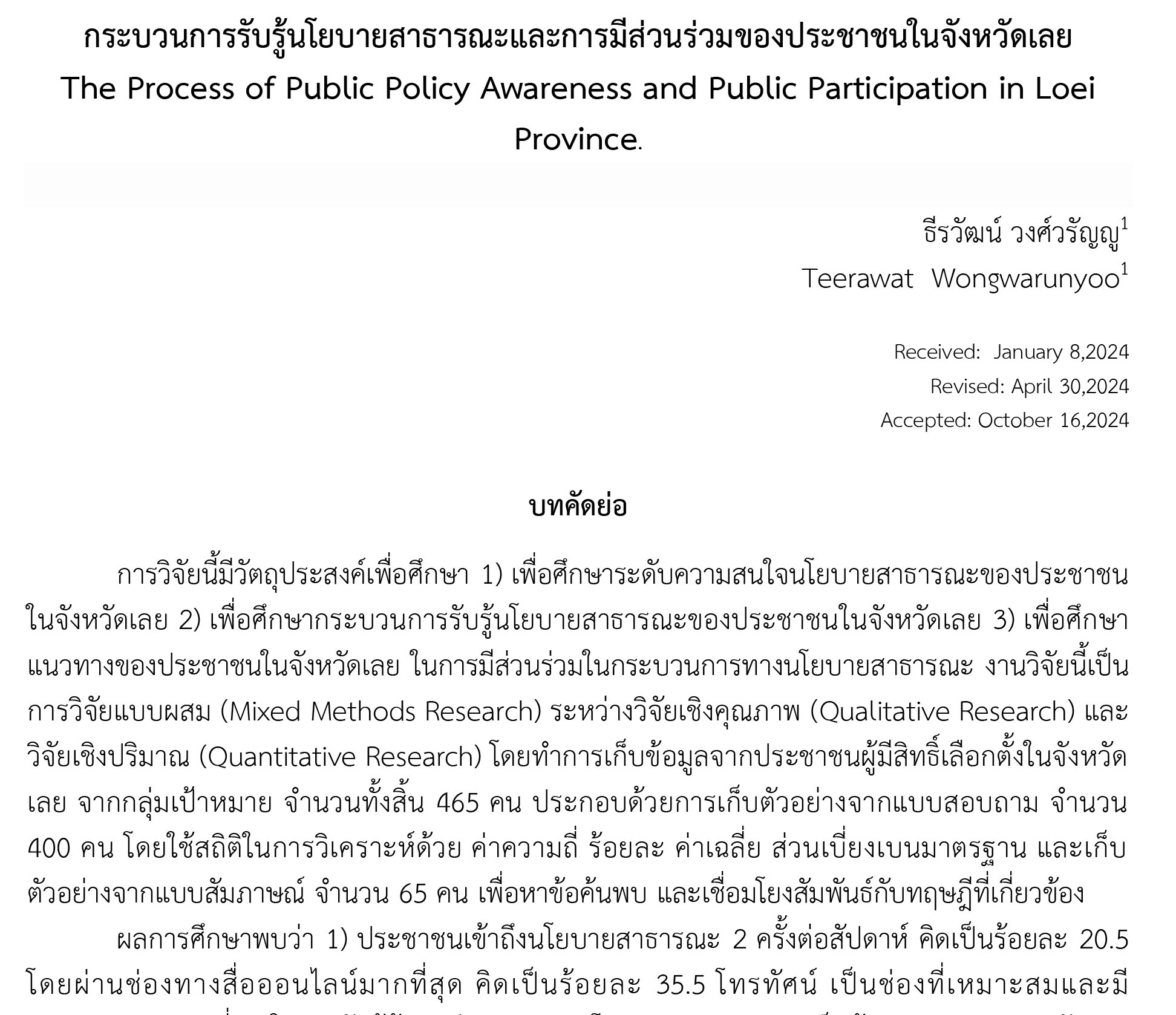The Process of Public Policy Awareness and Public Participation in Loei Province.
Keywords:
Awareness, Public Policy, EngagementAbstract
The objectives of this research were 1) to study the level of public policy interest of the people in Loei province, 2) to study the process of public policy perception of the people in Loei province, and 3) to study the guidelines of the people in Loei province. To participate in the public policy process. This research is a mixed methods research between qualitative research and quantitative research by collecting data from voters in Loei province. A total of 465 people were sampled from the questionnaire. 400 people using statistics for analysis. Samples were collected from 65 interviews to identify findings and correlate with relevant theories. The study found that 1) 20.5 percent of people access public policy twice a week, with the most online channels (35.5 percent), and television being the most appropriate and effective channel. In public policy awareness 34.8 percent 2) Level of public policy awareness The 12 main policies were moderate, with an average of 3.16. The average is 3.50. The policy with the lowest level of awareness is the 4th main policy: Building Thailand's role on the world stage. The average is 2.92 3) Level of understanding of public policy The 12 main policies were moderate, with an average of 3.04. The policy with the lowest level of understanding was Key Policy 4, Building Thailand's Role on the World Stage, and Core Policy 6, Economic Area Development and Regional Prosperity, with an average of 2.83 4) People will participate in public policy activities and express themselves by talking in friends or family and kinship and publicizing government policies through social media channels so that others can better understand and express themselves by voting for members of the House of Representatives. By supporting political parties that set their favorite policies. But if it is public policy that is not favored, it will refuse to participate. They also explain the reasons why they don't like the policy to others in order to be amenable to it through discussions or online. When irregularities in public policy or irregularities from policy implementation from government agencies are found. Complaints will be made directly through government agencies and coordinated through village leaders for advice or advice on next steps or complaints through online channels of relevant agencies. To participate in public policy making, they participate through social media expression and through organized government agencies or government officials, such as through village chiefs or village leaders
References
กุลธน ธนาพงศธร. (2522). นโยบายของรัฐ : อะไร ทำไหม และอย่างไร. กรุงเทพฯ: โรงพิมพ์ มหาวิทยาลัยธรรมศาสตร์.
กฤษณ์ ทองเลิศ. (2535). การร้องทุกข์ผ่านสื่อมวลชน ในช่วงเปลี่ยนผ่านคณะรัฐบาลจากพลเอกชาติชาย ชุณหะวัณ สู่รัฐบาลนายอานันท์ ฟันยารชุน. กรุงเทพฯ:
วิทยานิพนธ์รัฐนิเทศศาสตรมหาบัณฑิต, มหาวิทยาลัยจุฬาลงกรณ์.
ทินพันธุ์ นาคะตะ. (2526). นโยบายการพัฒนาและวิชาการ. กรุงเทพฯ: พัฒนาบริหารศาสตร์.ปีที่ 13 เล่ม 1 มกราคม 2526.
ทศพร ศิริสัมพันธ์. (2539). ความรู้เบื้องต้นเกี่ยวกับนโยบายสาธารณะ. กรุงเทพฯ: จุฬาลงกรณ์ มหาวิทยาลัย.
ทศพร ศิริสัมพันธ์. (2544). เทคนิควิธีการวิเคราะห์นโยบาย. กรุงเทพฯ: สำนักพิมพ์แห่งจุฬาลงกรณ์มหาวิทยาลัย.
ทิพาพร พิมพ์พิสุทธิ์. (2543). การกำหนดและวิเคราะห์นโยบายสาธารณะ. กรุงเทพฯ: มหาวิทยาลัย รามคำแหง.
นาตยา แท่นนิล. (2555). รูปแบบของกระบวนการนโยบายสาธารณะแบบมีส่วนร่วมในการจัด และอาหาร ปลอดภัยในจังหวัดสงขลา. จังหวัดสงขา:
วิทยานิพนธ์ปริญญาปรัชญาดุษฎีบัณฑิต สาขาวิชาการจัดการ สิ่งแวดล้อม มหาวิทยาลัยสงขลานครินทร์.
ปกรณ์ นันทกิจ. (2552). เรื่องกระบวนการรับรู้นโยบายสาธารณะของประชาชน ในเขตเทศบาลตำบล บางพระ อำเภอศรีราชา จังหวัดชลบุรี. จังหวัดชลบุรี: รายงาน
การศึกษาอิสระปริญญารัฐ ประศาสนศาสตรมหาบัณฑิต สาขาวิชาการปกครองท้องถิ่น วิทยาลัยการปกครองท้องถิ่น มหาวิทยาลัยขอนแก่น.
ปาริชาติ วลัยเสถียร. (2549). กระบวนการเรียนรู้และการจัดการความรู้ของชุมชน. กรุงเทพฯ: สำนักงาน กองทุนสนับสนุนการวิจัย.
พูลศักดิ์ ชูพาณิชสกุล. (2550). การมีส่วนร่วมของประชาชนต่อกิจกรรมการพัฒนาของเทศบาลเมืองอุตรดิตถ์. จังหวัดอุตรดิตถ์: ภาคนิพนธ์ปริญญารัฐประศาสน
ศาสตรมหาบัณฑิต สาขาการบริการและ พัฒนาประชาคมเมืองและชนบท มหาวิทยาลัยราชภัฏอุตรดิตถ์.
เมตต์ เมตต์การุณจิต. (2541). การมีส่วนร่วมของประชาชนในการบริหารการศึกษาโรงเรียนเทศบาล. วารสารการศึกษาตลอดชีวิต.
เรืองวิทย์ เกษสุวรรณ. (2550). นโยบายสาธารณะ. กรุงเทพฯ: บพิธการพิมพ์.
วิภา อุตมฉันท์. (2544). การผลิตสื่อโทรทัศน์และส่ือคอมพิวเตอร์: กระบวนการสร้างสรรค์และ
เทคนิคการผลิต. พิมพ์ครั้งที่ 2. กรุงเทพฯ: บุ๊คส์ พอยท์.
สำนักวิจัยสวนดุสิตโพล มหาวิทยาลัยราชภัฏสวนดุสิต. (2551). เยาวชน กับ การเมืองไทย.
กรุงเทพฯ: มหาวิทยาลัย ราชภัฏสวนดุสิต.
สำนักงานพัฒนารัฐบาลดิจิทัล. (2566). โครงการพัฒนาการมีส่วนร่วมของประชาชน. ฐานข้อมูล E-database. https://www.dga.or.th/document-
sharing/article/35827/ .
สิทธิโชค วรานุสันติกุล. (2544). จิตวิทยาการศึกษา. กรุงเทพฯ: บริษัทรวมสาสน์ จำกัด.
สมบัติ ธำรงธัญวงศ์. (2557). นโยบายสาธารณะ. กรุงเทพฯ: แนวความคิด การวิเคราะห์ และกระบวนการ.สำนักพิมพ์เสาธรรม กรุงเทพมหานครฯ.
สร้อยตระกูล อรรถมานะ. (2541). ทฤษฎีและการประยุกต์. กรุงเทพฯ: สำนักพิมพ์มหาวิทยาลัยธรรมศาสตร์.
อคิน รพีพัฒน์. (2527). ยุทธศาสตร์ในการพัฒนาชนบท : ประสบการณ์ของประเทศไทย. กรุงเทพฯ: มหาวิทยาลัยธรรมศาสตร์.
อนันต์ธนา อังกินันท์. (2525). สื่อมวลซนและการประชาสัมพันธ์เพื่อการศึกษา. กรุงเทพฯ: คุณพินอักษรกิจ.
Cochran, Charles L. and Malone, Eloise F. (1995). Public Policy. Perspective and choices. New York : McGraw-Hill.
Sriwichailamphun, T. (2013). Community economic development. Faculty of Economics, Chiang Mai University.
Thomas, R. Dye. (1978). Understanding Public Policy. Englewood Cliffs: Prentice-Hall, Inc.
Yamane, T. (1967). Statistics : An Introductory Analysis. New York : Harper and Row.









